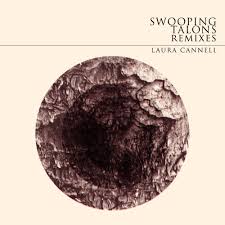Improvisatory neo-medieval music – not the sort of thing that you’d imagine lends itself to a remix album, is it? Often the reserve of the major label wallet-rinser, they can be rather inconsequential, disappointing affairs. Likewise, musicians working in such outlier and spontaneous fields as Laura Cannell tend to confine their music to the cloistered sphere of the live performance and live album. Yet Cannell has always been far from precious about her improvisatory craft. As an artist with a background in traditional folk, she is clearly highly aware of music’s subjectivity to change and reinterpretation over time. In offering up her work to an array of musical discombobulators, she allows new hands to sift latent resonances from her often spare compositions, and the results on Swooping Talons Remixes are occasionally rather astounding.
Though I’d argue that the intention behind Cannell’s work is musical rather than conceptual, many of the artists have picked up on the vague psychogeographical connotations laced throughout Beneath Swooping Talons. Though clearly contemporary the pieces and titles nevertheless carry with them images of unchanging natural landscapes and the feeling of interrelation between distant past and present. This is brought vividly to the fore by Kemper Norton in his extrapolation of ‘Cathedral Of The Marshes’, where Cannell’s Spartan violin lines are processed almost out of recognition into a gauzy haze of filmic tones, layered on top of each other in a sonic fog that brings to mind eerie rural vistas. Likewise Shape Worship, who has previously worked in bringing memory and place to life through music (on his London eulogy A City Remembrancer) brings a similarly eerie feel to the same Cannell track, though his treatment feels a little too close to Kemper Norton’s to be truly surprising. Elsewhere, Brighton folk group Lutine completely reshape Cannell’s double-barrelled recorder piece ‘Deers Bark’ into an accompaniment for a new arrangement for voice, piano and synth, where the sense of temporal displacement feels equally strong, with a clear vocal intoning lyrics about "drinking from another time".
Perhaps more unexpectedly, a good portion of the remixers on this album make a concerted pull on Cannell’s music toward the dancefloor. Ekoplekz’s lurching techno assault on ‘All The Land Ablaze’ would make a fine addition to any late-night paranoia-filled DJ set, though it’s Karen Gwyer’s understated edit of ‘For Sorrow Salt Tears’ that proves the most effective dance appropriation of Cannell’s music. Initially one might think her stab at the piece is rather lazy; sections of Cannell’s violin are presented in largely unedited form, with a clipped drum loop and unobtrusive synth tones seemingly being Gwyer’s only additions. Yet over the track’s eight minutes one is inexorably drawn in, Gwyer’s restrained treatment of the piece creating a subtly immersive and hypnotic effect that is impossible to shake off. Such subtle yet astoundingly effective uses of the raw materials of Cannell’s music is testament to both its versatility and its near-elemental tonal strength.
Throughout the album the remixers treat this raw material with varying levels of respect and so achieve varying levels of results. Peverlist manages to bring out some strong emotional resonances in his surprisingly beatless treatment of ‘Time Burns Falling Stars’, creating a new feeling of warmth and strangeness with its subaquatic bass pulses and squirming strands of electronic noise. Goof levels are high on Hoofus’ ‘Cathedral Of The Martians’, where Cannell’s violin functions merely as a sonic bedrock for the producer’s spongey spasms of synth and samples. Charles Hayward’s cacophonous, Cornelius Cardew-esque mash-up of music from across the entire album feels somewhat forced, yet this is somewhat made up for by Oliver Coates’s textural interrogation of ‘Deers Bark’, in which skittering electronic tones mimic the sounds of a violin bow bouncing over strings whilst warm gloaming synths bring to mind the arcane rural electronica of Solstice-era Coil.
Cannell’s open approach to music-making has won her an impressive list of admirers and collaborators, creating new possibilities for the seemingly cloistered worlds of folk and Early music. This remix album shows that even such a unique and carefully crafted vision as Cannell’s should never remain sacred.
<div class="fb-comments" data-href="http://thequietus.com/articles/19499-laura-cannell-swooping-talons-remixes-review” data-width="550">


